
Journal of Ocean University of China
Scope & Guideline
Charting the Course for Marine Science Excellence
Introduction
Aims and Scopes
- Marine Biology and Ecology:
Research on the biology, behavior, and ecology of marine organisms, including studies on species interactions, community dynamics, and the effects of environmental changes on marine life. - Oceanography and Physical Oceanography:
Studies focusing on the physical properties and dynamics of ocean systems, including wave dynamics, sediment transport, and ocean circulation patterns. - Marine Environmental Science:
Investigations into the impact of human activities, pollution, and climate change on marine environments, including assessments of ecosystem health and sustainability. - Marine Biotechnology and Pharmacology:
Exploration of bioactive compounds derived from marine organisms for potential pharmaceutical applications, including drug discovery and development. - Aquaculture and Fisheries Science:
Research aimed at improving aquaculture practices and understanding fishery dynamics, including stock assessments, breeding, and environmental impacts. - Marine Geology and Geophysics:
Studies related to the geological processes affecting marine environments, including sedimentology, paleoclimate reconstructions, and geophysical investigations. - Marine Technology and Engineering:
Development and application of technologies for marine exploration, monitoring, and resource management, including innovations in underwater acoustics and marine sensors.
Trending and Emerging
- Impact of Climate Change on Marine Ecosystems:
Research examining the effects of climate change, including ocean acidification and temperature fluctuations, on marine biodiversity and ecosystem services has gained significant traction, reflecting global concerns about climate impacts. - Application of Advanced Technologies in Marine Research:
The use of artificial intelligence, machine learning, and remote sensing technologies for data collection and analysis in marine studies is on the rise, indicating a trend towards more sophisticated and efficient research methodologies. - Sustainable Aquaculture Practices:
There is an increasing emphasis on sustainable practices in aquaculture, focusing on minimizing environmental impacts and enhancing productivity through innovative techniques and species diversification. - Microplastic Pollution and Its Ecological Effects:
Research into microplastics and their impacts on marine life and ecosystems is emerging as a critical area of study, addressing the growing concerns over plastic pollution in the oceans. - Marine Natural Products for Drug Discovery:
Studies exploring the potential of marine organisms as sources of bioactive compounds for pharmaceutical applications have become more prominent, reflecting the ongoing search for novel therapeutic agents. - Ecosystem-based Management Approaches:
There is a growing trend towards research that supports ecosystem-based management strategies, integrating ecological, social, and economic aspects to promote sustainable marine resource use.
Declining or Waning
- Traditional Fisheries Studies:
Research focused solely on traditional fisheries management and stock assessments has seen a decrease, likely due to the increasing complexity of marine ecosystems and the need for integrated approaches that consider ecological, social, and economic factors. - Physical Oceanography Focused Solely on Wave Dynamics:
While physical oceanography remains a key area, studies concentrating only on wave dynamics without integrating other oceanographic factors, such as temperature and salinity variations, have become less frequent. - Microbial Ecology in Marine Sediments:
Research specifically targeting microbial communities in marine sediments has waned, possibly due to a shift towards more comprehensive studies that incorporate broader ecosystem interactions and functions. - Conventional Pollution Studies:
Research focusing exclusively on conventional pollutants (like heavy metals) without considering emerging contaminants (such as microplastics and pharmaceuticals) has decreased, reflecting a broader awareness of pollution complexity. - Invasive Species Assessments:
While still relevant, studies exclusively addressing invasive species without context to their ecological impacts or management strategies have become less common, reflecting a shift towards integrative ecological assessments.
Similar Journals

Indian Journal of Geo-Marine Sciences
Empowering Global Research in Marine SciencesThe Indian Journal of Geo-Marine Sciences, published by the NATIONAL INSTITUTE OF SCIENCE COMMUNICATION & INFORMATICS (NISCAIR), serves as a vital platform dedicated to the dissemination and advancement of knowledge in the field of marine and geosciences. As an open-access journal, it allows for improved visibility and accessibility of research findings to a global audience, enabling researchers, professionals, and students to share insights into oceanography and related disciplines. With a publication history spanning from 2007 to 2010 and continuing from 2012 to 2024, it has established itself within the academic community as a reliable source of innovative research, despite being classified in Q4 of Oceanography and holding a Scopus rank that places it in the 27th percentile. This journal is particularly relevant for those investigating marine ecosystems, geological oceanography, and their interconnections, thus playing an essential role in fostering understanding and communication within this important area of scientific inquiry.
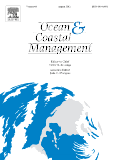
OCEAN & COASTAL MANAGEMENT
Innovating Solutions for Coastal ManagementOCEAN & COASTAL MANAGEMENT is a premier journal dedicated to the multifaceted fields of oceanography, aquatic science, and coastal management. Published by ELSEVIER SCI LTD and located in the United Kingdom, this esteemed journal boasts a remarkable Q1 ranking in prestigious categories, including Aquatic Science and Oceanography, reflecting its influential contributions to the field since its inception in 1992. The journal is recognized for its high impact, boasting a commendable presence in Scopus rankings across related disciplines, with notable placements in the 94th percentile for Aquatic Science and 92nd percentile for Oceanography. Although it operates under a subscription model, OCEAN & COASTAL MANAGEMENT continues to serve as a vital resource for researchers, professionals, and students seeking to advance their understanding of coastal ecosystems and effective management strategies. Through rigorous peer-reviewed research, the journal aims to foster knowledge exchange and practical applications in policy-making and environmental stewardship, making it an essential read for anyone engaged in the preservation and sustainable use of oceanic resources.

REVISTA DE BIOLOGIA MARINA Y OCEANOGRAFIA
Connecting Scholars to the Wonders of the SeaREVISTA DE BIOLOGIA MARINA Y OCEANOGRAFIA is a prominent academic journal dedicated to the fields of marine biology and oceanography, published by the Faculty of Marine Sciences and Natural Resources at Universidad de Valparaíso, Chile. Since its inception in 1996, this journal has been a vital platform for disseminating research findings and advancements in aquatic sciences, covering a breadth of topics relevant to the marine environment. With its current impact positioned within the Q4 quartile of both Aquatic Science and Oceanography categories in 2023, the journal serves as an essential resource for scholars, practitioners, and students alike, aiming to enhance their understanding of marine ecosystems. While the journal does not provide open access options, it continues to contribute valuable insights, helping to foster a deeper appreciation for oceanographic science and marine biodiversity. Located in the scenic city of Viña del Mar, Chile, this publication invites manuscripts that push the boundaries of knowledge and stimulate discourse within the marine sciences community, thereby promoting sustainable management and conservation of oceanic resources.

Ocean Science
Diving into Innovative Oceanic DiscoveriesOcean Science, published by COPERNICUS GESELLSCHAFT MBH, stands as a premier Open Access journal in the fields of Oceanography and Paleontology, with a commendable impact factor that highlights its influence in the scientific community. Since its inception in 2005, Ocean Science has provided a vital platform for the dissemination of innovative research and discoveries, boasting prestigious rankings of Q1 in both Oceanography and Paleontology categories as of 2023, along with impressive Scopus rankings (7th in Paleontology and 28th in Oceanography). Based in Göttingen, Germany, the journal's commitment to open access ensures that groundbreaking research is readily available to a global audience, fostering knowledge sharing and collaboration among academics, professionals, and students alike. As it converges towards its 20th anniversary in 2024, Ocean Science continues to be an essential resource for those dedicated to advancing our understanding of the marine environment and its geological history.
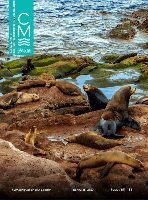
CIENCIAS MARINAS
Advancing Marine Science Through Open AccessCIENCIAS MARINAS, an influential journal in the field of Aquatic Sciences, is published by the Instituto de Investigaciones Oceanológicas of the Universidad Autónoma de Baja California. Established as an open access platform since 2006, it aims to disseminate original research and critical reviews that contribute to the advancement of marine science. With a commitment to fostering scholarly dialogue, CIENCIAS MARINAS serves as a vital resource for academics, researchers, and practitioners interested in the ecological dynamics and biological processes of aquatic environments. Although currently ranked in the fourth quartile in Aquatic Science by Scopus, the journal remains dedicated to increasing its visibility and impact within the research community. Housed in Mexico, it offers a regional perspective that underscores the importance of coastal and oceanic research, making it an essential avenue for exploring marine biodiversity and conservation efforts. By engaging with this journal, readers can stay abreast of the latest developments and contribute to the growing body of knowledge in marine sciences.

OCEANOGRAPHY
Innovating Research in Marine EcosystemsOCEANOGRAPHY is a premier journal dedicated to the field of ocean sciences, published by the esteemed OCEANOGRAPHY SOC. With an impressive Q1 ranking in Oceanography and a Scopus standing of #25 out of 145 in Earth and Planetary Sciences, this journal serves as a critical platform for disseminating high-quality research. Since its inception in 1992 and transitioning to an Open Access model in 2007, OCEANOGRAPHY has been committed to providing unrestricted access to groundbreaking studies, fostering collaboration and innovation within the international scientific community. Researchers, professionals, and students alike can explore a wide range of topics, including marine ecosystems, ocean circulation, and climatic influences, making it an essential resource for anyone invested in understanding our oceans. With its headquarters in Rockville, MD, USA, it brings together a diverse body of work that is pivotal for advancing knowledge in the critical arena of oceanography.

Ocean and Coastal Research
Unlocking the secrets of marine ecosystems.Ocean and Coastal Research, published by the Institute Oceanográfico of the University of São Paulo, is an essential academic journal dedicated to advancing the fields of Aquatic Science, Oceanography, and Water Science and Technology. Established in 2020, the journal has quickly become a noteworthy platform contributing to the understanding and sustainable management of marine and coastal ecosystems, with an open access model that promotes the dissemination of critical research findings. Although currently categorized in the fourth quartile across its respective fields in 2023, the journal serves as an emerging repository of valuable insights for researchers, professionals, and students alike, aiming to make impactful discoveries that address contemporary challenges in ocean conservation and resource management. The journal's editorial team is committed to fostering interdisciplinary collaboration and upholding rigorous peer-review standards, thereby ensuring high-quality contributions that reflect the dynamic nature of marine science. With an E-ISSN of 2675-2824, all access to published articles is freely available, supporting global research efforts addressing crucial environmental issues.
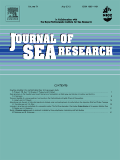
JOURNAL OF SEA RESEARCH
Fostering Interdisciplinary Insights in Marine ResearchJOURNAL OF SEA RESEARCH, published by Elsevier, is a premier academic journal dedicated to advancing knowledge in the fields of aquatic science, ecology, and oceanography. Since its inception in 1996, this journal has provided a vital platform for researchers and professionals to disseminate groundbreaking findings and promote fostering interdisciplinary discussions. With its impressive Q2 ranking in multiple categories, including Aquatic Science and Ecology, Evolution, Behavior and Systematics, it positions itself as a significant contributor to marine and environmental studies. The journal is accessible in both print (ISSN: 1385-1101) and online formats (E-ISSN: 1873-1414), ensuring wide reach and engagement within the scholarly community. Researchers and students alike will find the journal not only a reliable source of information but also a source of inspiration for future explorations. With a commitment to quality and a broad scope that spans fundamental to applied research, JOURNAL OF SEA RESEARCH remains an indispensable resource for understanding the complexities of marine environments and their relevance to our changing world.
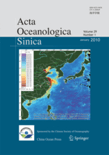
ACTA OCEANOLOGICA SINICA
Illuminating the Complexities of Aquatic EnvironmentsACTA OCEANOLOGICA SINICA, published by SPRINGER, stands as a significant voice in the fields of Aquatic Science and Oceanography, contributing vital research and insights since its inception in 1985. With an ISSN of 0253-505X and an E-ISSN of 1869-1099, this journal maintains a strong international focus, delivering high-quality peer-reviewed articles that address pressing marine and freshwater environmental issues. Although it operates under a subscription model, its Q3 ranking in both Aquatic Science and Oceanography demonstrates its solid standing within Scopus, placing it in the 48th and 44th percentiles respectively. The journal aims to foster knowledge exchange and collaboration among researchers, professionals, and students by providing a platform for innovative studies and comprehensive reviews. With a dedicated editorial board and a commitment to advancing scientific understanding, ACTA OCEANOLOGICA SINICA serves as an essential resource for anyone engaged in the study of oceanographic phenomena and aquatic ecosystems.
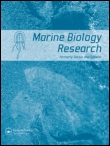
Marine Biology Research
Empowering the next generation of marine researchers.Marine Biology Research is a premier journal published by Taylor & Francis, focusing on the dynamic field of marine biology and its intersecting realms of aquatic science, ecology, and oceanography. Since its inception in 2005, this journal has served as a crucial platform for researchers and professionals to disseminate their findings, with a vision extending to 2024 and beyond. The journal is recognized with a Q3 quartile ranking in both Aquatic Science and Ecology, Evolution, Behavior and Systematics, underscoring its growing influence in these fields as evidenced by its Scopus rankings. Located in the United Kingdom, Marine Biology Research aims to foster collaboration and innovation through open access options, facilitating knowledge exchange among the academic community. With a steady commitment to advancing marine sciences, this journal is an invaluable resource for those dedicated to understanding and preserving our ocean ecosystems.